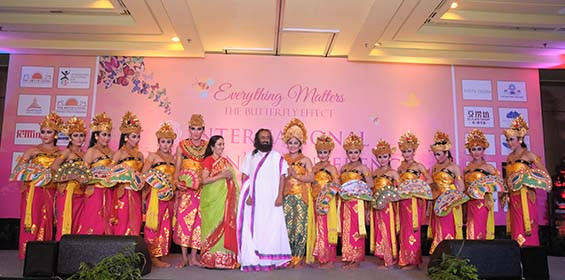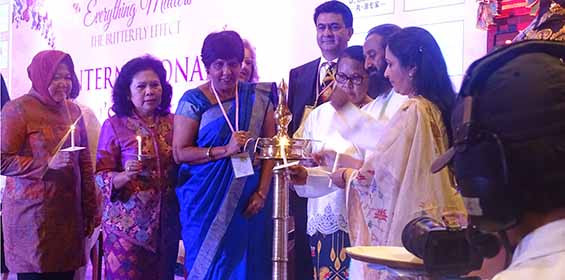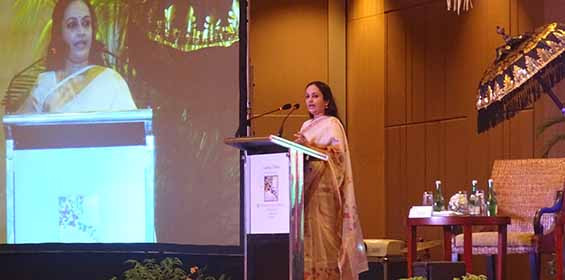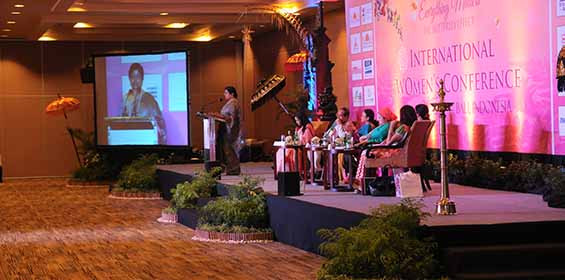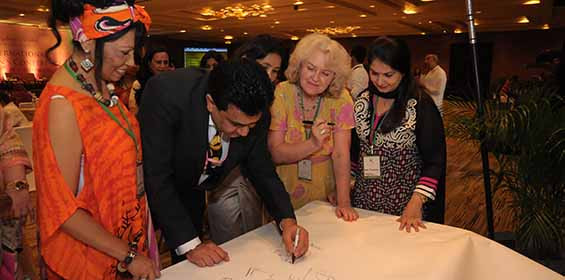Excerpts from the Speech of The Honorable Mrs. Leela Devi Dookun-Luchoomun Minister of Education and Human Resources, Mauritius
Distinguished guests, ministers, sisters from every part of the world, organizers, all of us here are today in a conference where we are aiming at making the world better and making us realize that every single thing that we do matters.
First of all let me wish all of you good morning. I bring to you the greetings and good wishes from the Government and citizens of Mauritius. I would like to start by thanking the Art of Living foundation for the invitation extended to me to participate in this conference.
Mauritius is a small island in the Indian Ocean. We have a population of around 1 Million. It is a place where all religions of the world meet – Hinduism, Christianity, Islam and Buddhism and importantly it has a reputation for political stability, good governance and racial harmony. We have gender parity in terms of access to education. We keep stating that women should rise higher up but across the world we have noted that girls do better than boys in education. That being said, there are larger issues in different parts of the world, concerning the plight of girls and women that we cannot and should not blind ourselves to.
Globally there are more than 115 Million children who are currently out of school, with more than half of them being girls. A pity when we recognize that an improvement in the quality and level of education provided to girls and women, has saved the lives of 4 Million children. In the part of the world I come from, in the sub Saharan Africa the lives of some 1.8 Million children could have been saved, had their mothers had the opportunity to go to school.The same applies for many part of Asia, where 44% of illiterate women give birth without having any sort of pre-natal care. Conversely the figure stood as 9% for mothers having had opportunity to attend and complete schooling.
Besides it is well known that education acts like a vaccine against a whole set of diseases including HIV, AIDS, TB, Malaria and the like. The link between education and development has since long been established. Educating women is a guarantee against high infant, child and maternal mortality rates. It has also been said that with every additional year of female education, child mortality reduces by 18 per thousand. It certainly takes educated mothers to understand the significance of education for their children as a part of the carry on and multiply effect, one that is commonly today referred to as the inter-generational educational mobility and yet the world keeps forgetting that women are the custodians, the vehicle for transmission of culture, of the way of life that both safe guards the past and paves the way for the future.
Women who hold power need to seek to make a difference. Those having legislative powers have to ascertain that laws are passed but also that laws are passed against practices that not only discriminate against women but also act as barriers to their empowerment. However, the challenges are numerous ranging from deeply religious and therefore cultural to the highly logistical.
I will be the first to agree that the battle for women empowerment has not been fully won yet, however mindsets are changing, glass ceilings are getting cramped, while glass ladders are being replaced by iron ones and all that it takes is the need to be consistent with ourselves and that raises a whole question, is there any consistency between our words and our actions. Case in point, how far are we who have the power to decide on matters, act on them. How far are we willing to go in our advocacy, not only verbal but action driven advocacy. To what extent are we willing to go to become the voice of the voiceless, of those subject to constant abuse, the abuse of the poor, the handicapped, children who are employed at a tender age etc.
Martin Luther King Jr. once said “the ultimate tragedy is not the oppression and cruelty by the bad people, but the silence over that by the good people”. So where does that leave women. It is our ethical responsibility as women to muster the courage of our conviction. We must learn to break the silence and take the first crucial step on the path of our own redemption. Let us face it, salvation cannot always come by the way of actions undertaken by others for us. We need to be the instrument to face our own destiny. The rest will follow automatically.
I would like to thank Gurudev Sri Sri Ravi Shankar ji for having stated the very nice words towards women – come up, rule the world. It is by working with the other gender that we can improve the world.
True leaders ultimately are those who accept responsibility for their actions and also prove to be accountable and with accountability comes a willingness to assume responsibility for social sustainability. Ladies and gentlemen, I thank you all for your patience and attention.









